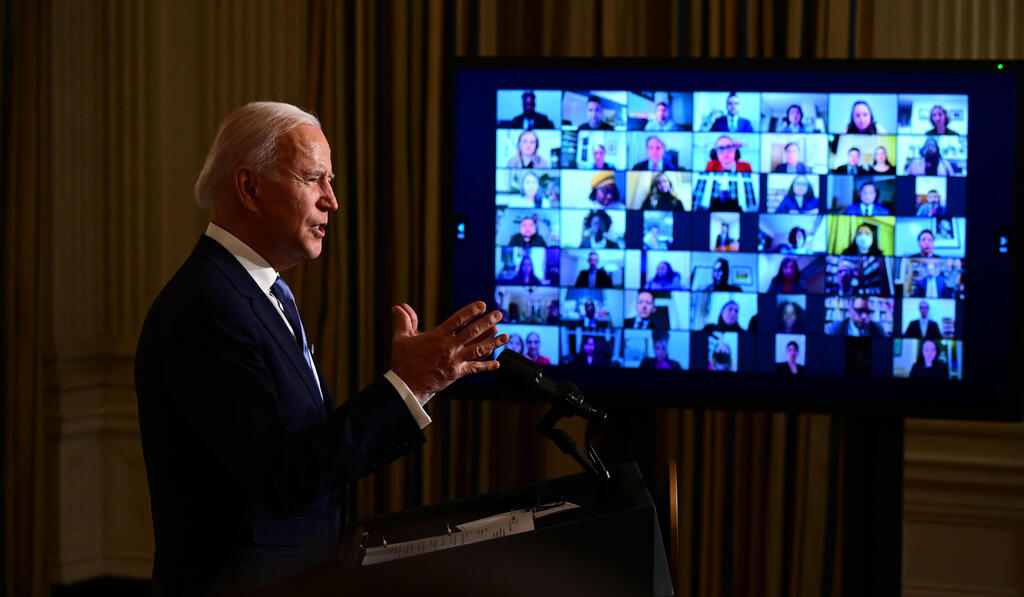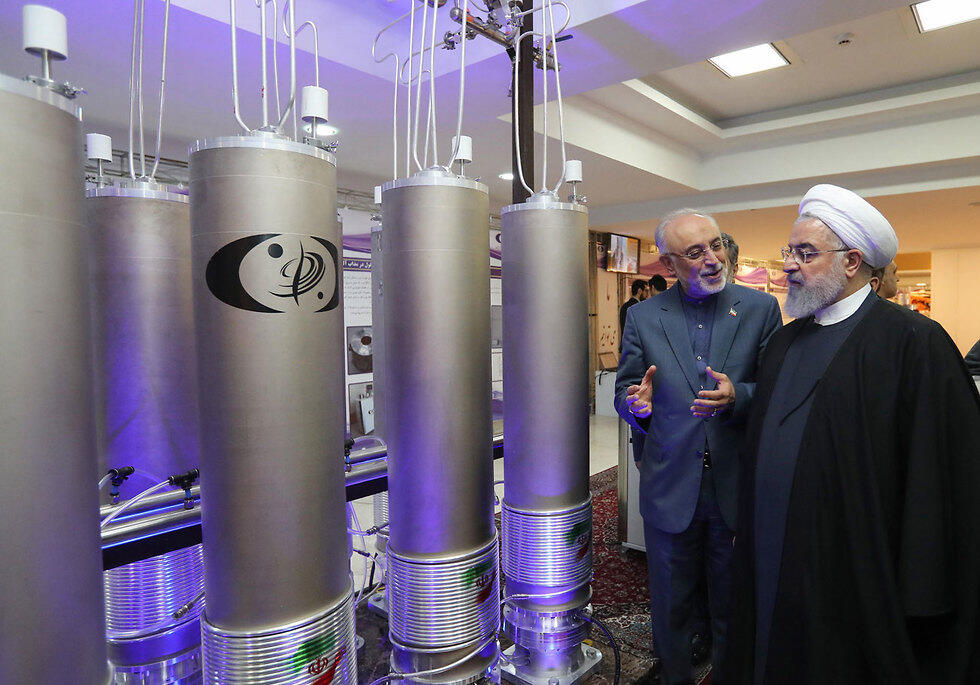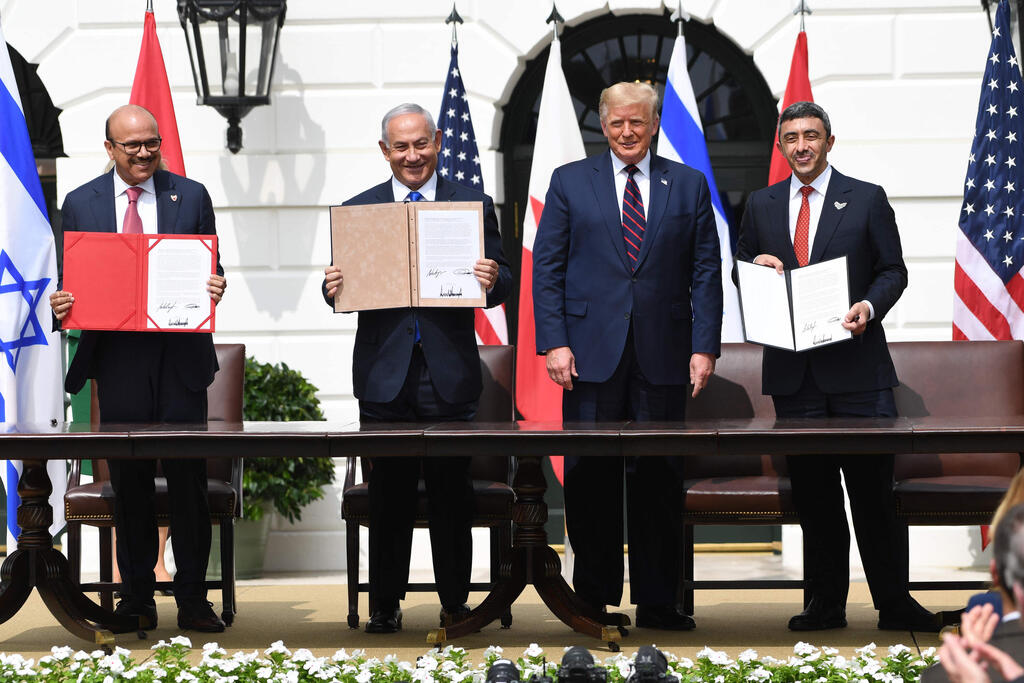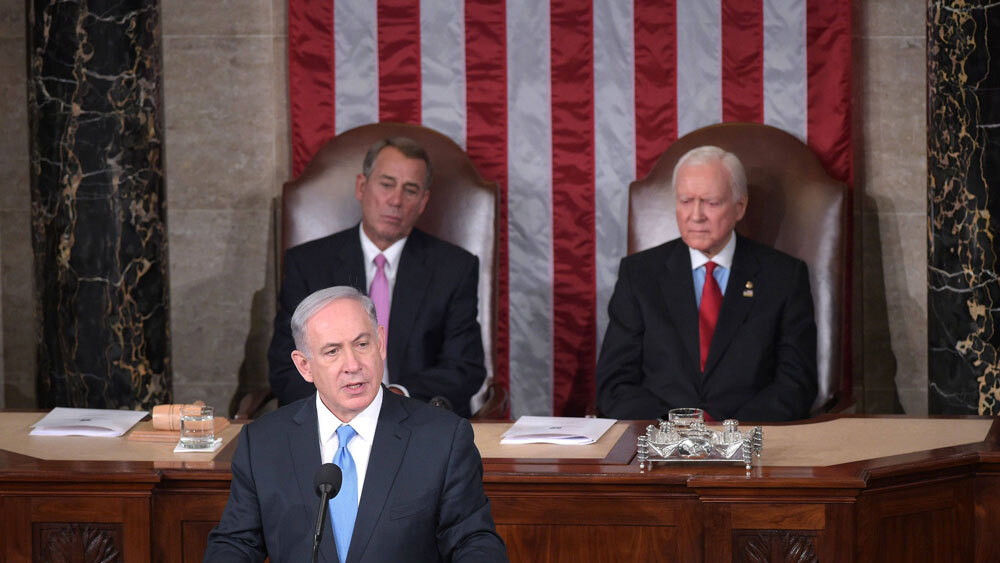Four years of Donald Trump proved that U.S. leadership of the free world is irreplaceable. And even before President Joe Biden was sworn into office on Wednesday, his new administration had devised a list of national priorities and immediately began implementing them.
An economically and militarily strong America is a critical component of Israel's security. If Biden can heal the rifts created by his predecessor, then the Israeli government - if it acts wisely - could make its national interests a bipartisan issue once again.
5 View gallery


U.S. President Joe Biden talks to staff members remotely from the White House after he was sworn in on Wednesday
(Photo: AFP)
Trump's maximum pressure campaign failed to force Iran to negotiate a new nuclear agreement, one that would include restrictions on its missile development. Instead, the Islamic Republic used the last few years to accelerate its nuclear program and has made advances towards nuclear capabilities.
Experts believe Tehran is at most 10 months away from its first viable nuclear warhead, and if not stopped could be a nuclear threshold state by the end of 2021.
This would not only change the power dynamics in the Middle East, it would threaten the entire world.
5 View gallery


Iran's President Hassan Rouhani inspects one of the country's nuclear facilities
(Photo: AFP)
Israel has already stated that a nuclear Iran is not an acceptable option and would likely launch a military strike to prevent it, sparking a regional war that would ultimately compel the United States to get involved.
Biden's national security team and the president himself have admitted this scenario keeps them awake at night, not only because of Israel's potential actions but because Iran's nuclear and long-range missile capabilities could threaten America's security as well.
Reliable Western sources say that even a temporary resolution to the crisis with Iran must be a priority of the new administration.
Washington has chosen the diplomatic track to advance a new deal that will curtail Iran's long-term ambitions, including its missile development program and its aggressive policies in the Mideast. This would include improvements to the JCPOA.
Israeli defense officials believe Jerusalem should not openly announce opposition to Biden's policy, arguing that the new administration is clearly as aware of the threat as the Israeli government and is as adamant to prevent the Islamic Republic from achieving nuclear capabilities.
Prime Minister Benjamin Netanyahu said in an interview just days before the end of the Trump presidency that returning to the 2015 nuclear agreement would be unwise. But his allies say he also understands that the maximum pressure campaign failed and that Biden has already opted for a diplomatic solution.
5 View gallery


L-R: Bahrain FM Abdullatif al-Zayani, PM Benjamin Netanyahu, U.S. President Donald Trump, and Emirati FM Abdullah bin Zayed Al-Nahyan at the signing of the Abraham Accords at the White House, Sept. 2020
(Photo: AFP)
Netanyahu realizes he must cooperate with the new White House and that a confrontation with Biden during the current election campaign in Israel could harm his chances of winning.
He is also aware that a disruption to U.S.–Israeli military cooperation would endanger Israel's ability to take military action against Iran should it be necessary.
Israel's stated position to the new Biden administration would be to urge the United States to keep economic sanctions in place.
It would also a to be consulted ahead of any decision about the direction of the negotiations and that the U.S. does not agree to any new agreement that does not include the issue of Iran's missile program.
Israel will advocate for maintaining and strengthening of the anti-Iran axis of Arab states promoted by the Abraham Accords.
But there is one obstacle that must be removed before Jerusalem's relationship with the new administration can be solidified and that is Netanyahu's standing in D.C.
5 View gallery


Benjamin Netanyahu attacks the Obama administration's Iran deal in an address to Congress in 2015
(Photo: AFP)
The prime minister's actions during the Obama years have caused resentment and distrust towards the Netanyahu government among defense and political officials in Washington.
One can only hope that their professionalism will overcome their personal animosity - for the sake of Israel's security.


